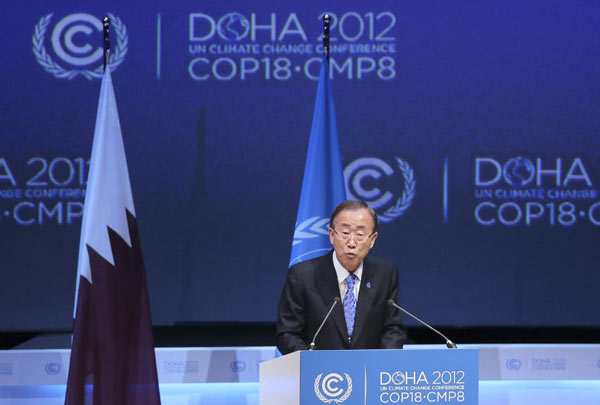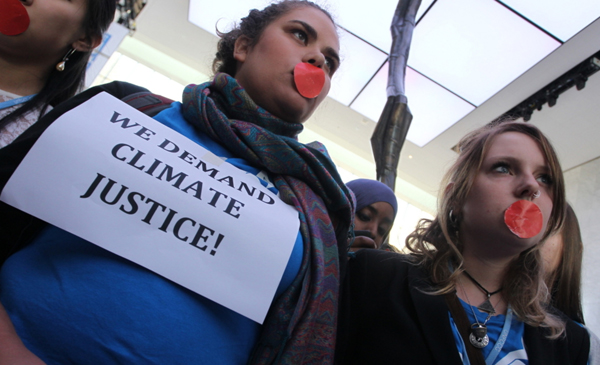Doha talks end with slight progress
By LAN LAN and WU WENCONG in Doha, Qatar (China Daily) Updated: 2012-12-09 23:51The two-week UN climate conference in Doha ended on Saturday after 24 hours of extended negotiations with a package of deals that some participants said were disappointing but acceptable.
The conference was due to finish on Friday but remained unpredictable through Saturday evening, due to the demands made by Russia, Ukraine and Belarus on the issue of excess emissions allowances.
 |
|
UN Secretary General Ban Ki-Moon talks during the opening ceremony of the plenary session of the high-level segment of the 18th session of the Conference of Parties (COP18) of the United Nations Framework Convention on Climate Change (UNFCCC) in Doha, Dec 4, 2012. [Photo/Agencies] |
Within minutes of beginning the final plenary session, Abdullah bin Hamad Al-Attiyah, the Qatari president of the conference, said the Doha package deal, called the Doha Climate Gateway, had been adopted.
The wrangles of the past two weeks were resolved, but as UN Secretary-General Ban Ki-moon said in a statement on Saturday, "More needs to be done".
Xie Zhenhua, China's top climate change official, said after the meeting, "The Doha conference has met Chinese delegate's expectations, and we are satisfied with the outcome".
But there were disappointing aspects, Xie said.
China will follow a low-carbon path and contribute to fighting climate change on the basis of equal and common but differentiated responsibilities and capabilities while pursuing sustainable development, he said.
Working closely with other BASIC countries ― Brazil, India, South Africa and China ― Beijing played an active and constructive role in the meetings, Xie said.
He called on developed economies to be more ambitious in cutting greenhouse gas emissions and raise the money needed to help developing economies address climate change.
The United States and the European Union agreed to the deal with reservations.
"The work is definitely not perfect, but it's a modest and important step in the right direction," said Connie Hedegaard, EU climate chief.
Delegates from small island states were unhappy with the deal.
"Finance was missing in Durban, and it remains missing in Doha," said a representative from Nauru, which leads the Alliance of Small Island States.
The final document "encourages" developed economies to put up at least $10 billion a year up to 2020, the same annual amount as the Fast Start Finance but not more.
"That's very disappointing," said Martin Khor, executive director of the South Center, an intergovernmental organization of 52 developing economies that also holds observer status at the United Nations.
The deal includes an eight-year extension of the Kyoto Protocol ensured by the EU, Australia, Switzerland and other industrialized countries, which agreed to binding emission cuts by 2020.
But the limited scope of the second commitment period of the Kyoto Protocol and weak financial commitment from developed economies disappointed developing economies.
Under the final document, an overall maximum of 18 percent emissions reductions from 1990 levels has been set for less than 40 developed economies under the protocol.
According to the Intergovernmental Panel on Climate Change's Fourth Assessment Report in 2007, developed economies as a group would have to reduce emissions by 25 to 40 percent from 1990 levels to keep temperature rises within an acceptable range.
A midterm review that would reassess the scope of their commitments has been arranged for no later than 2014. "But developed economies don't really have to raise the scope by then," said Li Shuo, a climate and energy campaigner at Greenpeace East Asia.
The issue of excess emissions allowances ― which total 13 billion tons in greenhouse gases ― was the most contentious topic during the last 24 hours of the discussions.
Strong objections have been raised over allowing the carryover of excess emissions permits, which would result in greenhouse gas levels decreasing only on paper, not in the atmosphere.
The two biggest proponents of excess emissions allowances, Poland and Russia, at first insisted on their lenient limits being carried over beyond 2012.
Poland initially refused to sign the second commitment deal until it received assurance from member states that it would receive flexible treatment on emissions cuts.
Russia, Belarus and Ukraine also insisted on the carryover, as the pollution permits they were given allow their heavy industries to thrive.
 |
|
Local and international activists inside a conference center, demanding urgent action to address climate change at the UN climate talks in Doha on Friday. UN climate negotiators locked horns on the fi nal day of talks in Doha to produce measures aimed at halting the advance of global warming. [Photo/Agencies] |
The Doha deal also establishes a loss-and-damage mechanism that helps the most vulnerable countries deal with the adverse effects of climate change.
"It's huge breakthrough," said Khor of South Center.
The Doha conference ensured the second commitment period of the Kyoto Protocol, the only legally binding agreement for addressing global warming, but also paved the way for a new global climate regime after 2020.
The Doha climate talks are a modest step toward a global climate deal in 2015, said Hedegaard, adding there will be more climate battles in the coming years.
Contact the writers at lanlan@chinadaily.com.cn and wuwencong@chinadaily.com.cn







